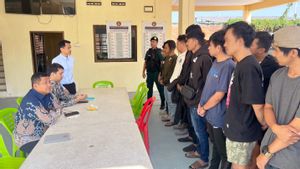JAKARTA - The COVID-19 pandemic requires the application of distance learning (PJJ) to all students in Indonesia. Head of the DKI Jakarta Education Agency, Nahdiana, said there were 6 challenges in facing this forced learning method, especially in Jakarta
The first is the psychological condition of the child. Changes in the learning environment will have an impact on children's psychological problems. In particular, in the home conditions that do not make the child comfortable in learning.
"Demographically, even in Jakarta, not all children are in a home environment that is more comfortable than the school environment. Some of the children's home conditions are no more comfortable than school conditions. We must understand that together," Nahdiana said in a statement on Sunday, 27 July.
The second challenge is the role of parents or guardians of students. Parents should monitor student learning progress through communication with teachers. The learning given by the teacher must be continued by parents with competency training.
The third challenge is the competence of teachers in implementing distance learning systems. "This is a competency that not only requires mastery of information technology, but brings comfort and happiness to children in learning activities. And this is not an easy thing," said Nahdiana.
The fourth challenge is supporting facilities. The PJJ system requires students to provide electronic devices such as cell phones or computers, as well as an adequate internet quota.
Nahdiana said the provincial government provided learning support assistance in a number of ways. "In DKI, apart from relaxing school operational costs (BOS), we are trying with several vendors to organize special packages for students," he said.
The fifth challenge is curriculum preparation. Nahdiana acknowledged the teacher's confusion about compiling a student learning curriculum without having to do it face-to-face.
"Indeed, we do not have a special curriculum for distance learning. However, there must be a way how this curriculum can be adapted to distance learning," said Nahdiana.
The sixth challenge is setting the right study hours. Nahdiana realized that not necessarily all students have personal electronic devices that can be used to study at any time. Therefore, teachers must be able to understand the circumstances of their students in regulating study hours.
"It is necessary to set appropriate study hours so that students do not study too long and their assignments do not collide. These tasks need to be synchronized," explained Nahdiana.
The English, Chinese, Japanese, Arabic, and French versions are automatically generated by the AI. So there may still be inaccuracies in translating, please always see Indonesian as our main language. (system supported by DigitalSiber.id)













